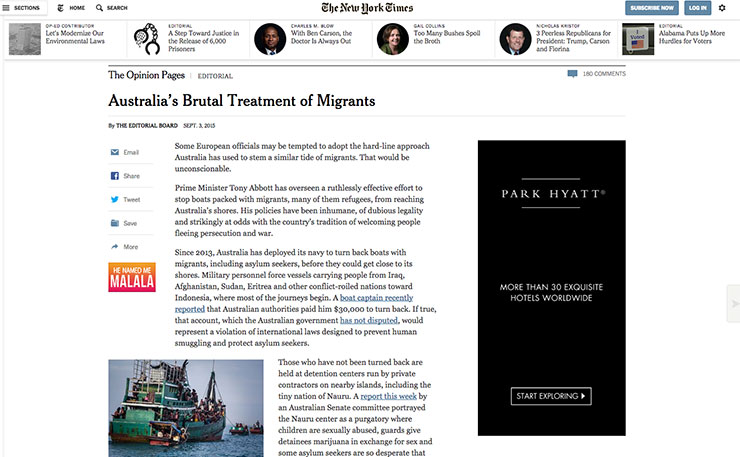Note: article contains distressing image.
The New York Times has issued a sternly worded editorial warning European nations not to follow Australia’s example on refugee policy, saying it would be “unconscionable” for the continent to mimic the nation’s hard-line deterrent approach.
As Europe starts to feel the brunt of the greatest displacement of people since the Second World War, the Times acknowledged there would be some temptation to copy the brutal methods deployed by Australia, which it denounced as “inhumane, of dubious legality and strikingly at odds with the country’s tradition of welcoming people fleeing persecution and war.”
“The world’s war zones are all but certain to continue to churn out an extraordinary number of refugees and economic migrants in the years ahead. Those people understandably will head to the most prosperous nations, hoping to rebuild their lives,” the paper editorialised.
“It is inexcusable that some find themselves today in situations that are more hopeless and degrading than the ones that prompted them to flee.”
The crisis of displacement caused by the ongoing conflicts in Syria, Iraq, Afghanistan, and Eritrea in particular has put pressure on developed countries to greatly increase their assistance to those who flee.
While Australia has seen both major parties fall into virtually identical positions, including support for offshore detention and boat turn-backs, some of Europe’s most powerful leaders have been speaking in favour of a humane approach to migrants and refugees, encouraging all on the continent to do their bit to help.
In doing so, they have employed the kind of rhetoric that has become entirely unimaginable in Australian politics.
Conservative German Chancellor Angela Merkel previously drew criticism for her harsh response to a Palestinian refugee on live television, but has joined French President Francois Hollande in calling for Europe to do more.
Like politicians in Australia she has faced opposition on the domestic political front from those who would bolt closed the doors to the nation. This is how she responded.
“There can be no tolerance of those who question the dignity of other people,” she said recently. “There is no tolerance of those who are not ready to help, where, for legal and humanitarian reasons, help is due.”
Her country is expected to have 800,000 people arrive this year.
In its editorial the Times particularly criticised the Abbott government for the conditions in the Nauru detention camp, the passage of The Border Force Act – which criminalises public disclosures made by staff in detention centres – and the payment of illegal bribes to people smugglers to turn their boats back to Indonesia.
The criticism comes as the world mourns the death of three-year-old Aylan Kurdi, the image of the Syrian child lying lifeless on a beach prompting anger and grief around the globe.
don’t be offended that people are sharing pictures of #AylanKurdi be offended that these children are allowed to die pic.twitter.com/MV4PeB0Jkr
— Curtis Bebro (@CurtisBebro) September 3, 2015
The devastating scene has served as a reminder to European leaders and the world that failing to help those fleeing war, persecution, and poverty, comes at an enormous price. In the case it was the life of a child.
Donate To New Matilda
New Matilda is a small, independent media outlet. We survive through reader contributions, and never losing a lawsuit. If you got something from this article, giving something back helps us to continue speaking truth to power. Every little bit counts.





